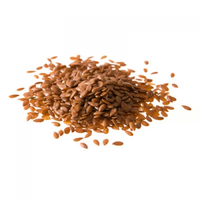Flax seeds

Flax seeds ripen in the nests of special boxes, which are located on the stem of the plant. Two varieties are considered the most common: Dolgunets (for yarn) and curls (for collecting flax seeds). Flax is grown almost all over the world: from subtropics to northern latitudes as a technical or oilseed crop. Since ancient times, linen fiber clothing has been created in Russia, which is exported to other countries and is a source of income. However, do not underestimate the nutritional quality of flax seeds. In ancient Babylon, this product was as valuable as olives in Greece. In France, in the 8th century, a law was generally adopted stating that every resident of the country is obliged to eat flax seed. This contributed to the recovery of the nation. And, however, not in vain: flax seeds are a unique product that should not be excluded from your diet. He is one of the main representatives of healthy and healthy food around the world. Flax seeds contain a large amount of substances that form mucus, and therefore can be an excellent thickener of sauces, soups and gravy. They are also raw materials for the manufacture of linseed oil and linseed flour.
In addition to the food industry, linseed is used in the production of medical and cosmetic products, as well as varnishes, paints and glues.
Benefits of flax seeds
Flax seeds are a source of food insoluble fibers, which helps to eliminate constipation and other intestinal problems. An interesting fact is that the flax seed is added to horse feed the day before the race to provide a hygienic component of the competition.
Flax seeds contain lignans, and therefore this product is able to prevent the occurrence and development of a cancerous tumor of the mammary glands. Women who regularly consumed flax seed during menopause had a 17 percent reduction in breast cancer.
Omega-3 and Omega-6 fatty acids, entering the cell, positively affect its activity, and also contribute to an increase in the transmission rate of nerve impulses.
Substances contained in linseed have a beneficial effect on a person's mood, prevent Alzheimer's disease, treat joint inflammation and regulate the amount of cholesterol in the body. There was a positive effect of taking flax seeds on hair growth, nails and kidney strengthening.
Among other things, the content of essential fatty acids Omega-3 and Omega-6 make flax an important product in the vegetarian diet.
Damage to flax seeds
Eating flaxseed is contraindicated for individual intolerance or allergies. Also, the amount of this product should be limited in its diet to pregnant women, because doctors have not yet sufficiently studied the issue of the influence of flax on their body.
Flax will not be useful for diseases of the gastrointestinal tract (gastritis, colitis, ulcer, pancreatitis). People with kidney or gallbladder stones should also be careful when taking flax seeds because of their ability to stimulate the choleretic process.
How to choose flax seeds
Fresh and edible flax seeds are characteristically shiny in the sun and have a hard, dense shell. They should not stick together. As a rule, flax seeds have a crumbly texture. Taste the seed - if it crunches and meets the rest of the criteria, you can safely purchase it.
Application of flaxseeds
If the seeds are considered as a dietary supplement, it is better to fry them until the nut aroma appears. Thus, the taste of raw seeds is eliminated.
You can add flax seeds to your morning porridge or curd. It will also be harmoniously combined with vegetables in lettuce.
If you have a coffee grinder, you can fill the grain tank with seeds and get linseed flour. Fill it with warm water, mix well and enjoy the taste of linseed porridge. If you don't like this option, linseed flour is perfect as a binder instead of eggs in making pancakes, pancakes or muffins.
534 kCal flax seeds
Energy value of flax seeds (Ratio of proteins, fats, carbohydrates - ju):
Proteins: 18.29 g (~ 73 kCal)
Fats: 42.16 (~ 379 kCal)
Carbohydrates: 1.58g (~ 6kCal)
Energy ratio (bj | y): 14% | 71% | 1%
 Español
Español Français
Français Português
Português Русский
Русский 简体中文
简体中文 繁體中文
繁體中文 日本語
日本語 한국어
한국어 العربية
العربية Türkçe
Türkçe Қазақ
Қазақ Deutsch
Deutsch Italiano
Italiano Українська
Українська
